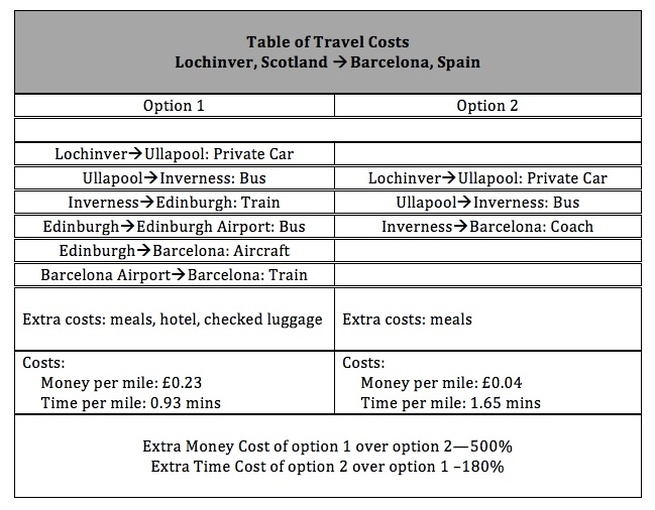|
Calculating the cost of travel is not a straightforward economic exercise as it comes with a variety of categories such as money, time and effort. Some of these costs are private costs, and some are merely opportunity costs. Travelling is understood to cost money, but the other costs can be overlooked in the effort to part with as little of one’s hard earned cash as possible. Costs, both quantitative and the qualitative, add up differently for everyone based with individual preferences determining which costs you are willing to pay. Henry David Thoreau once said that the cost of anything is the amount of life given up in exchange for it and it seems that learning what costs you are willing to pay-- as well as those you are not-- is a valuable lesson to learn while traveling. There are several ways to define travel and each approach gives some insight into the costs that can be associated with travel. It most often refers to the activity of moving from geographic position A to geographic position B, with the best efficiency resulting from a combination straight line travel, zero interchanges and high speeds. The resulting costs: money, time and effort. Often the fastest, easiest or the most time efficient travel will cost you the most amount of money while the slowest journey with the most interchanges will be the more frugal option. What you are willing to pay is sometimes determined by the urgency of reaching the destination or the total effort you are willing to expend. For some, time has its own currency and the seemingly cheaper upfront costs of travelling the slower journey have high costs in time lost for another activity. A slower mode of transport might not be worth the higher relative cost of time and therefore cash is forfeited in order to save time. For others, the extra effort expended in transfers, layovers and changes in modes of transport is not worth the apparent lower cost of travel and they are willing to payer higher money costs to buy the apparently easier journey. Although the shortest distance between two points is a straight line, this course of travel is rarely an actual option unless moving across very short distances. Rather, travel is more accurately described through a second definition in the idea that travelling involves a journey, which includes the sometimes long and difficult process of change: change in location, change in environment and change in self. The associated costs: money, time, and life. Rather than the costs of just moving from position A to position B, the real costs are the combination of money, time and the stealthier cost of the value detracted from (or added to) the life of the individual. The choices one makes in the determining efficiency of the costs of travelling in part determined by what life the individual is willing to exchange. Is the individual most willing to part with free time, or with money requiring time and labour to earn? What added value will be contributed from experiences encountered throughout the journey? The time and money costs are easy to quantify but sometimes the life costs are more difficult to evaluate. For example, on a journey travelling from Lochinver, Scotland (geographic point A) to Barcelona, Spain (geographic point B) on a bank holiday weekend, I was faced with evaluating the costs that I was willing to pay for my travel. The easiest place to start is with a breakdown of time and money costs for the most expensive (aside from chartering a private jet!) journey in money terms compared with least expensive route. Here are my travel options: Call me crazy, but I opted for the 44 hour, £70 Option 2 over the 24 hour, £353 Option 1 not because I longed to spend 44 hours on a coach and not because I didn’t have £353 in my bank account. This choice was made on the assumption that in addition to a fatter bank account, I would also ultimately have a more fulfilling journey (with a story to tell!), as well as slightly less expended effort by taking this choice. So yes, it cost me nearly an extra day in time, a resource that I cannot regain nor know how much of it that I have remaining in the balance. However, this time was spent in gaining many new experiences: admiring the twinkling lights around the moonlit Edinburgh Castle, my first Chunnel crossing on the car train, watching the sunset with the Eiffel Tower as I journeyed through Paris, a bit of cloud spotting over the French vineyards and wondering at the geostrategic implications of the mountains forming the border between France and Spain, helping to keep the latter safely out of the World Wars. When I arrived in Barcelona, I was greeted by the same glorious sunshine I would have found had I arrived a day earlier, possibly less tired, but certainly poorer in both money and experience. If Thoreau was right, I am richer from this journey by adding to my quantity of life from the addition of these qualitative experiences. And after all, travelling is really the about the journey more than it is about getting to the destination. #travel #philosophy #economics
1 Comment
Raul Gahnalloca
6/15/2015 03:57:22 am
Your opportunity cost analysis is cool. I am looking forward to reading more about your adventures.
Reply
Leave a Reply. |
AuthorCorine loves a good adventure. She's partial to wilderness, UNESCO World Heritage sites and wine. Based in the United Kingdom, she has roamed the trails and streets of six continents. This is a chronicle of her experiences, seasoned liberally with philosophical musings. Archives
June 2015
Categories
All
|

 RSS Feed
RSS Feed